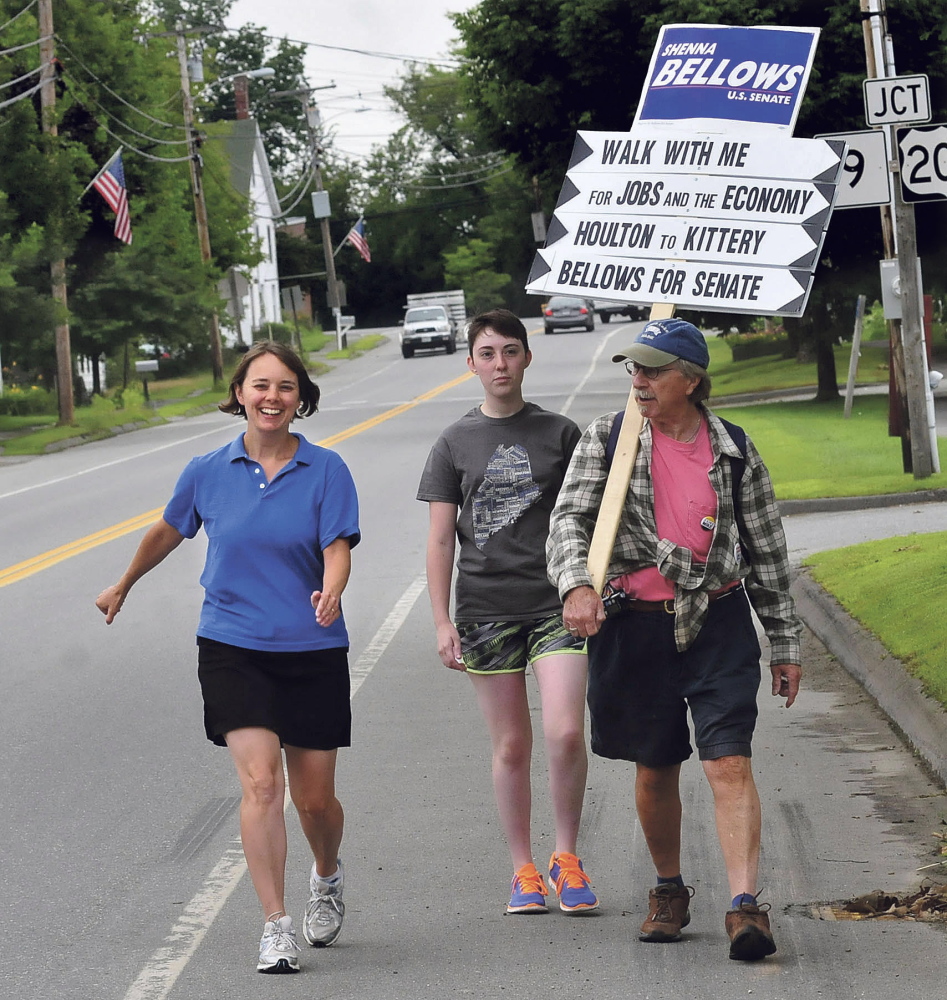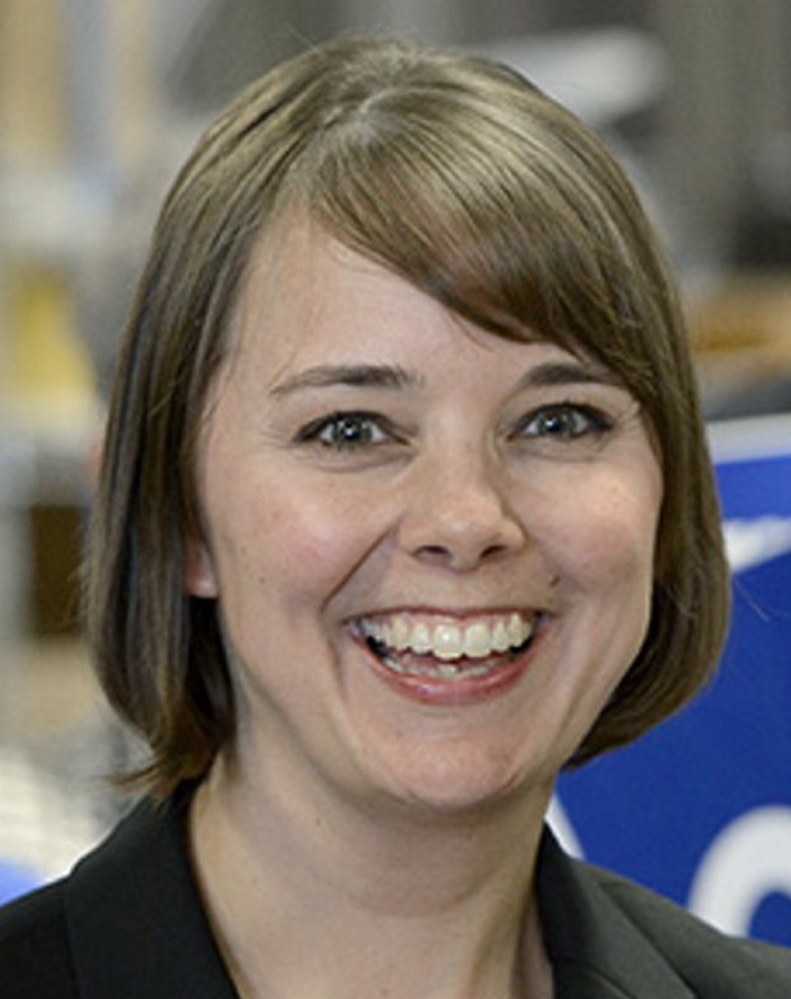TROY — Shenna Bellows was about 15 miles into a 20-mile walk through central Maine farm country when a man in a passing SUV laid on the horn and gestured out of the window.
“You got my vote!” the man shouted, giving a big thumbs-up as he cruised by Bellows and her small entourage of campaign workers and supporters.
For Bellows, a Democrat, it was the kind of moment that buoys the spirit nearly halfway through a 24-day, 350-mile-long trek across Maine to build name recognition and voter support in her campaign against Republican U.S. Sen. Susan Collins.
But Bellows, the former executive director of the American Civil Liberties Union of Maine, faces a much longer and more difficult electoral road ahead to defeat Collins. The 18-year Senate veteran is better funded, well known in national political circles and well-liked by some members of Bellows’ own party in Maine.
L. Sandy Maisel, a political science professor at Colby College in Waterville, said hitting the road for a statewide walk is as good as any other campaign strategy during the “dog days of August,” when few Mainers are otherwise paying attention to politics. But while she has “distinguished herself” as a serious candidate, the reality is Bellows is running against a popular incumbent, Maisel said.
“I think she is running a very good campaign; it is just against monumental odds,” said Maisel, a Democrat.
Bellows has become accustomed to such comments. Asked about the challenges she faces, Bellows was ready with a response about the importance of “full and fair debate” during elections.
“No one should be able to claim re-election without a credible opponent,” Bellows said without missing a stride or a wave to passing vehicles.
“Eighteen years is a long time to be in the United States Senate and one thing I am hearing from a lot of folks is a sense that, from an economic perspective, we are on the wrong track,” she said. “We are not going to change the status quo by electing the same people and hoping for different results.”
Bellows is modeling her 350-mile walk from Houlton to Kittery on one undertaken in 1972 by former U.S. Rep. William Cohen, who would later serve as senator and President Clinton’s defense secretary. Cohen’s 600-mile walk across Maine’s 2nd Congressional District is often credited with helping him pull off an upset win.
Collins began her career as a staff assistant for Cohen in Washington in 1975. While Collins isn’t planning to replicate her former boss’s walk, the campaign continues its aggressive fundraising and mobilization campaign despite a commanding lead in the polls – including a Portland Press Herald survey in June that showed her with a 72-17 percent lead – and a roughly $3.5 million cash advantage at the end of June.
Spokesman Lance Dutson said Collins is “doing what she always does: making contact with as many Mainers as possible” through appearances throughout the state. Additionally, the Collins campaign has recruited more than 500 people to serve as town or county chairman on the re-election campaign.
Dutson said the extent of the local organization shows Collins’ widespread grassroots support.
“The unique thing about Sen. Collins is she has always been so approachable and I think the people of Maine feel they have a more direct connection with her,” Dutson said. He added that Collins’ “reputation as a bipartisan problem solver” is appreciated by Maine voters.
Bellows’ campaign has tried to portray the candidate as more closely aligned with the views of Maine’s working class than Collins. She also campaigns on key Democratic issues – such as increasing the minimum wage, protecting women’s right to abortion and reducing the role of big-money interests in politics – as well as government overreach issues likely to resonate with libertarians.
“I think it is great to have a new voice out there, a progressive voice who really knows the issues,” said Greg Rossel of Troy, who along with his wife, Norma, brought a deluxe roadside picnic lunch to Bellows and her support staff on Wednesday. “It is so important these days, when campaigns are all about money and are all about the upper class, that this campaign is much more about the grassroots and the working class.”
Bellows typically starts out at 7 a.m. and goes until about 4 p.m. – averaging 15 to 20 miles per day – before attending evening events or forums arranged by her campaign.
Much of her time is spent traversing long stretches of Maine’s rural, sparsely populated roadways. Because she cannot knock on even a small percentage of the doors along the 350-mile route, Bellows said she approaches people when she sees them outside or in the door, as she did on several occasions outside of Unity last week.
Bellows talked with a mother at home with several young children. The woman did not promise her support but applauded Bellows for taking a strong stance on key Democratic social issues. An older man attempting to repair a riding lawnmower tire paused long enough to greet Bellows politely and take a “Bellows For Senate” notecard before turning his attention back to his task.
The candidate is hoping that such informal interactions, when combined with press coverage and an early wave of television advertising, will provide a much-needed boost to her campaign.
“People remember a time when politics was truly about the grassroots connection with the candidates and discussion of issues in front yards and living rooms,” Bellows said.
This is not 1972, however, and these are not easy times to be a congressional challenger.
Congress’ approval rating is at an all-time low as Americans bemoan Capitol Hill’s seeming inability to do anything but squabble. For instance, Congress adjourned last week for a five-week recess without addressing a litany of serious issues, including responding to the surge of unaccompanied Central American minors crossing the southern border.
Yet despite the steady decline in the congressional approval rating, few voters appear to hold their local representatives responsible for the dysfunction.
In 2012, roughly 90 percent of House and Senate incumbents were re-elected. The Senate’s re-election rate has not dipped below 75 percent since 1980, according to the Center for Responsive Politics.
Jim Melcher, a politics professor at the University of Maine at Farmington, said the campaign walk may not be as uncommon today as Cohen’s 600-mile trek was in 1972.
“But it is great publicity for a challenger who has a lot of work to do to build name recognition,” Melcher said. “It also helps her to get to know corners of the state which she might not get to so much otherwise, and it gives campaign supporters a low-cost way to get to know the candidate and participate in a common cause.”
With Congress on track to be the least productive in modern history – after setting a new low just last session – why would anyone want to join its ranks?
“There are two options in response to our frustration and despair about what is happening in Washington: We can either escape and pretend it is not happening, or engage and try to make things better,” Bellows said. “My experience at the ACLU taught me that you can achieve seemingly impossible goals by building unusual and strong coalitions.”
Now south of Augusta, Bellows hopes to reach Kittery by Aug. 12.
——————————
Note: This article was amended at 10:44 a.m., Aug. 4, 2014, to remove a statement about Congress failing to pass a highway trust fund bill. Congress completed work on a short-term highway trust fund bill late Thursday night, sending it to President Obama for his signature.
Send questions/comments to the editors.





Success. Please wait for the page to reload. If the page does not reload within 5 seconds, please refresh the page.
Enter your email and password to access comments.
Hi, to comment on stories you must . This profile is in addition to your subscription and website login.
Already have a commenting profile? .
Invalid username/password.
Please check your email to confirm and complete your registration.
Only subscribers are eligible to post comments. Please subscribe or login first for digital access. Here’s why.
Use the form below to reset your password. When you've submitted your account email, we will send an email with a reset code.